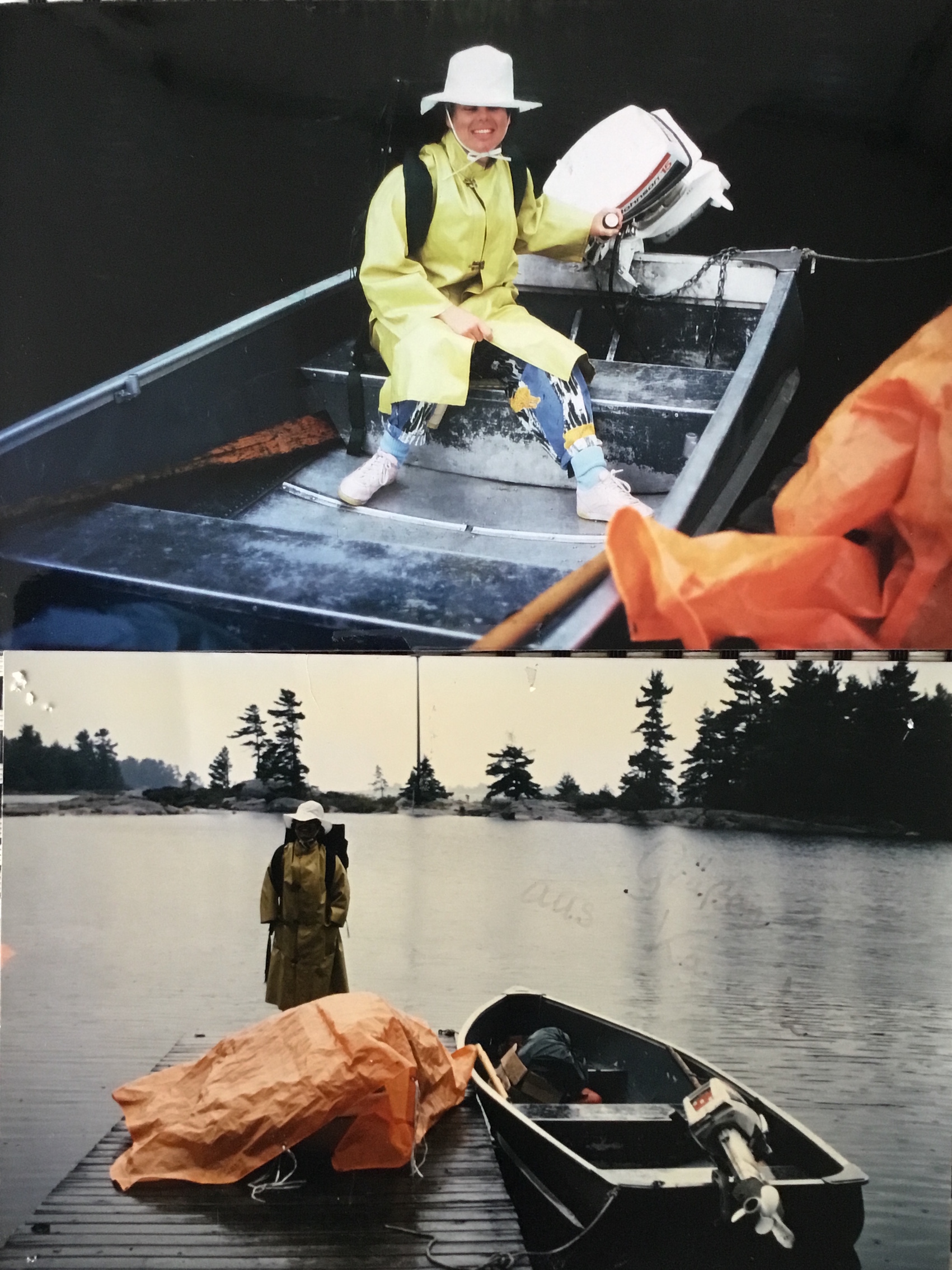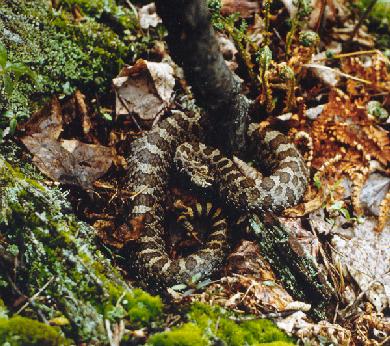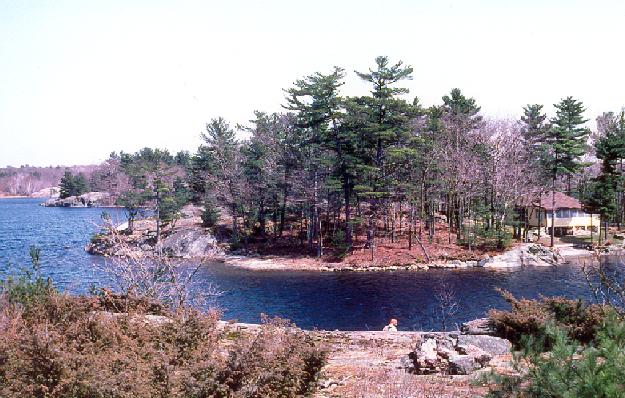


The cottage
Through a former MSc student of my professor, I rented a cottage on an island in Georgian Bay on Lake Huron for doing field work on the coast. His grandfather built two cottages in the area in the mid thirties, one now belonging to his father and one to Aunt Margaret and we would get Aunt Margaret's cottage.
The wooden cottage was large with a view to the lake and protected by dense forest in the back. It had a full veranda in front of the house protected by mosquito nets, a spacious living room, 4 bedrooms, a big kitchen and even a shower and toilet. In the summer the nights were warm and auntie preferred to sleep on the veranda.
We got the place for the first week of September, the week after Labour Day and most cottages were empty as the weather is unpredictable this time of the year, clearly the end of the summer. His father picked us up at the 12-Mile Lake Marina which is run by a native Indian tribe and this is one of the more scenic areas. Numerous rocky islands are dotted by cottages, all keeping a fair, very private distance. The calm wind in the summer with daytime temperatures of 25-30 degrees Celsius make it a seasonal tropical paradise. The water is crystal clear and warm, suitable for both swimming and drinking.
When we arrived, Caroline was surprised by the large cottage. She was used to either a small cottage as we used before on an inland lake or, more uncomfortable, the hunting cabin in the woods I used most of the times.
The hunting cabin on 12 Mile Road, deep in the forest, was primitive but cheap and belonged to a group of locals in the nearby village of McTeer and my contact was Jerry, a retired fireman who lived in an old shabby house. It had a stove, fridge and lamps that all ran on natural gas but no electricity. The heater was a primitive wood stove but worse, the toilet was outside, an outhouse with lime to 'flush' and take away the smell. The house was full of small cracks and mosquitoes would come in all the time. She would only join me 1 or 2 weeks of the two month field work period as she did not like the mosquitoes especially bad in May and June.
My contact Jerry would spent a lot of time in the local "Legion", the official meeting place for ex-military personnel but also used by other government department like the fire department. This was basically a bar and if I couldnít find him I would go look for him there finding him half-drunk, barely able to give me a key of the cabin. In the 3rd season I asked Jerry about the red sticks that were stored in the kitchen cupboard all the time suspecting it was something illegal. He answered: "Ooh, that is dynamite, we use it to blow up beaver dams. Those damn beavers, always-making lakes in the areas where deer want to hide. They chase them away." Pretty illegal, not just the dynamite as beavers are protected animals.
This week I had no student so we could do whatever we wanted provided I got the work done. The cottage was overlooking the lake and the numerous trees made it barely visible from the lake and dense woods bordered the garden. An ideal sunbathing spot, Caroline could be finally topless if not less. Canadians women are very prudish showing their body and topless bathing was still not done at the time. Men however, always try to go skinny-dipping and always talked about it.
Wild life
The area on the coast is touristy but the inland pretty wild. Once a month I would see a bear and in two occasions almost stepped on a rattle snake as it was sunbathing during cool 16-17 degrees Celsius weather trying to catch some warmth. A path or open spot in the dense forests were ideal for them. Garter snakes I would meet every day but the rattlesnake were hunted down by the locals and cottagers and now there are only a few left over despite being protected.
One season Caroline's brother Jan was visiting us and I took him in the woods to show him some real bush. After 1 km we met a small bear cub in an open spot and mommy bear was nowhere to be see. Jan said, "What a cute little bear, lets have a look and let me take a picture..." and before he could utter another word I made him clear that we were leaving right away. He did not understand my rush at first but when I explained him that mommy bear would around he understood.
A real danger was poison ivy, a small green shrub that has an oily substance and on contact make you itch for days. Some people even need to take medicines. The problem with poison ivy is that it resembles any other green bush shrub. Another annoyance could be shunks. When you meet those you carefully backtrack as their spray make you smell for days as well. Luckily you can smell if they are nearby.
One afternoon, deep in a swamp area, we passed a wild bees nest and I got stung in my neck. I quickly developed a fever that lasted for several hours and had to be driven home by Barry, my field assistant and B.Sc student. The next day a bee stung Caroline in the ring finger, again. She also developed a fever and the swelling was so bad I had to cut off the ring.
We always took along our cat, a large main coon cat which are known to be a bit wild being a cross-breed of the wild North American cat and European cat in the late 18th century. Our cat loved this area. He would catch field mice or chipmunks, both not used to vicious animals around peoples homes. The cottagers treat these animals like pets.
The Chief
The 12-Mile Bay marina is owned by a local Indian Tribe, the area given to them by the Canadian government to have a reserve and start a business in the thirties when the cottages started to be built in the area. Not that many Indians were serious about the business, maybe 25% was actively working and the rest was not doing very much but they all shared the income. The Chief, a big fat man, over 150 kg, was about to be ousted by the next vote as he spent most time drinking and sleeping. He would pick us up after a week at 10 AM and take us back to the marina.
At 11 AM no one appeared so I tried to call him using the nearby public radiophone. After trying several times and a lot of squeaking and cracking sounds I finally got his wife. She told me that he was still in bed and would let him know that he was supposed to pick us up. Nothing happened for several hours and I called him again. He was on his way.
At 5 PM he finally arrived, just before sunset, and his breath had a penetrating alcoholic smell. The weather got worse, the wind picking up and it started raining and the temperatur around 10 Celsius. We quickly loaded our baggage in his boat and left. As it got dark he had to navigate more carefully through the narrow rocky channels while the wind and rain was hitting the boat. He seemed to know the channel by heart. Our cat got upset about the noise and shaking. Caroline almost started crying, feeling we were going to hit a rock and sink in this storm. After one hour we finally got to the marina in pitch dark.
Relieved we loaded the stuff in the car. I paid the chief and gave him a large tip.
More photos
Waiting for the chief in poor weather to take us back to the marina
Poison Ivy.
Barry Wiseman "on the rocks".
Beaver lake, now dry. Dead trees.
Harrison Family cottage.
Sailing boat, very popular.
Our transportation.
Hunting cabin, used for two month in 1982, 1983 and 1984. Not bug proof.
Martin van Kranendonk "on the rocks".
Jean and a professor from Beijing "on the rocks".
Fried Schwerdtner "in the snow". Weekend field work in April, bit early, an eager and a fun trip.